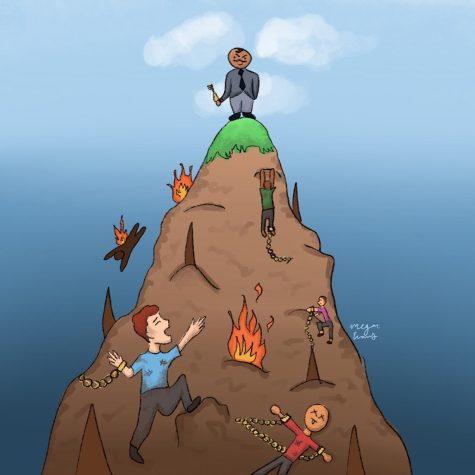Indiana passes controversial religious law: Can businesses discriminate against LGBT?
On March 26, Governor Mike Pence of Indiana passed a controversial law called the Religious Freedom Restoration Act, or RFRA, which gives businesses the ability to discriminate and deny service to anyone from the LGBT community. This law had been in the works since Feb. 9, when Pence joined a rally in favor of changing a state law to better protect the religious community.
The law labeled Senate Bill 568, states “that a state or local government action may not substantially burden a person’s right to the exercise of religion.” It’s later subscripted that the persons involved are any people, associations, businesses, churches, religious institutions, trusts, foundations and any other legal entity, who are able to apply this law when making decisions based on their religious beliefs.
The largest, most controversial issue with SB 568 is that it allows for discrimination against gay individuals. Now, businesses in Indiana can deny access to anyone who isn’t straight. Shortly after the bill was passed, the small town of Valpo began an “inclusion campaign.” Businesses in the city can be seen with stickers in the windows that read “this business serves everyone.” Even notable celebrities and figureheads were seen tweeting about the degrading religious freedom law.
As of March 30, Republican legislators were vying for a chance to clear up the miscommunication by issuing an enactment of the law. Reportedly, it wasn’t supposed to originally allow discrimination. Even Pence has contacted Congress so that the bill can be restated, proving that is doesn’t call for any type of discrimination.
By April 2, the bill was clarified with the Indiana General Assembly to better state that it doesn’t provide the right to discriminate based on “sexual orientation” or “gender identity.” As stated by the “Indy Star,” “these laws can coexist and so can we”, in mention of keeping the SB 568 to protect the religious freedoms of others while still keeping an older ordinance that protected the rights of LGBT citizens.
Before SB 568 was adjusted, there was national outcry and rightfully so. American citizens are born into a country labeled “the land of the free and the home of the brave,” where we are all entitled to our rights of the “pursuit of happiness.” Another, more controversial issue is that there is a separation of church and state when legal decisions are being made.
The reason for the nation being so impacted by this law was, of course, the whole religious aspect. It’s justifiable for anyone of the religious community to be allowed to practice their beliefs but, as many know, many religions are against the gay community, believing it to be highly sinful.
But, by allowing full religious freedom without clarification, that discrimination isn’t okay; it’s easy to assume that said community will be discriminated against. People are people, no matter their race, ethnicity, gender, religion or sexual orientation. If someone is religious and doesn’t believe that “being gay is OK,” then that is perfectly acceptable, but it’s not acceptable to allow hundreds of people to be told “no” just because they live a certain lifestyle.
Do we demand that people learn to be a different color, even though they are born that way and can’t fix it? No. So why would we demand that someone changes their sexual orientation just so they have access to our restaurants?
After a month of nationwide controversy and public outcry, SB 568 has been modified to better clarify that discrimination against LGBT individuals isn’t allowed. That’s one more win for the ever-growing LGBT community.








![Freshman Jordan Delon [left] and sophomore Jaden Winterhalter [right] round the final stretch as they run the 800 meter.](https://www.fhs-press.com/wp-content/uploads/2022/05/Sports-Track-Field-Pawlowski-475x317.jpg)



